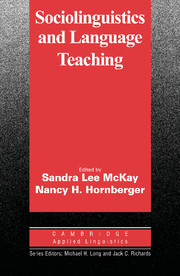Part III - LANGUAGE AND INTERACTION
Published online by Cambridge University Press: 22 July 2009
Summary
In their discussion of language and gender, Freeman and McElhinny presaged our move from the macrolevel to the microlevel of social analysis as they traced research and theory in a field that spans both the view that the subordinate status of women is reflected in and partly perpetuated by gender-differentiated language use and a view of discourse as constitutive of social identities which are negotiated and constructed in interaction. Here, in Part 3 of our exploration of language, society, and education, we move to the microlevel of both social and linguistic analysis for a closer look, as we learn about the role and linguistic realizations of such phenomena as situated comembership, contextualization cues, sociolinguistic transfer, interpretative mismatch, and oppositional discourse in face-to-face interaction. As discussed in the other three parts of this book and shown in Figure a in the front matter, the macro-micro distinction here connotes emphasis, rather than exclusion; the authors of the three chapters in this part take care to point out that the larger social and cultural context is both reflected in and affected by the microlevel interactions they explore in depth.
Frederick Erickson, in “Ethnographic Microanalysis,” opens the part with an overview of the perspective, methods, and salient findings of the ethnographic microanalysis of social interaction, also known as microethnography, the research approach which he is primarily responsible for developing.
Information
- Type
- Chapter
- Information
- Sociolinguistics and Language Teaching , pp. 281 - 282Publisher: Cambridge University PressPrint publication year: 1995
